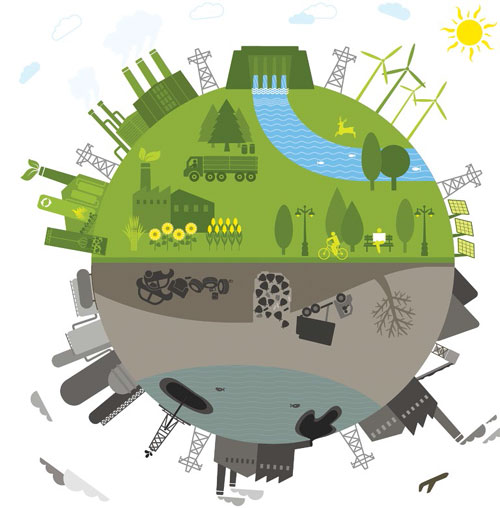CONCEPT OF SUSTAINABLE DEVELOPMENT IN INDIA
“WE DO NOT INHERIT EARTH FROM OUR ANCESTORS. WE BORROW IT FROM OUR CHILDREN.”
3/3/20242 min read


Sustainable development means different thing to different people. Although this principle is the most important principle of environment law, the concept is difficult to define in a few words.
It can be defined as an approach to the economic development of a country without compromising with the quality of the environment for future generation. According to the Brundtland Report, “Sustainable development is the development that meets the need of the present generation without compromising the ability of the future generations to meet their own needs.”
The expression “Sustainable Development” was first used in 1972 at the Cocoyoc Declaration on Environment and Development and has hence been used whenever environment related issues are talked about.
The underlying idea of this concept is that natural resources like the sea-bed are not the fruits of the labour put in by the present generation, and that therefore, they should be used and exploited, always keeping in the mind the needs of the future generation.
The resources such as fossil fuel and minerals are non-renewable, once these resources are used completely, the total quantity will stand reduced forever. Sustainable developments means that such resources are to be used with utmost caution, keeping in mind the needs of the future generation.
Sustainable Development is a vast concept today, and more than forty areas fall under the scope of sustainable development, namely:
· Atmospheric chemistry
· Bio diversity
· Renewable energy
· Forests
· Health
· Industry
· Mountains
· Poverty
· Sanitation
· Sustainable agriculture
· Sustainable tourism, etc.
Sustainable development aims to promote the kind of development that minimizes environmental problems and to meet the needs of the existing generation without compromising with the quality of the environment for future generation.
Although Sustainable development means different to different people, the following eight principles are fundamental to the concept:
1. Inter-generational equity
2. Use and conservation of natural resources
3. Environmental problems
4. The precautionary principle
5. The polluters pays principle
6. Obligation to assist and co-operate
7. Eradication of poverty
8. Financial assistance to developing countries.
The International Equity Principle (IEP) is the central principle in the definition of sustainable development as given by the Brundtland Report. It simply means that every generation is under an obligation to preserve its natural and cultural heritage for the enjoyment of the future generations.
ENVIRONMENTAL CRISIS
A situation where the environment fails to perform its vital functions of life sustenance is known as Environmental Crisis. When resource extraction remains below the rate of resources generated or generation of waste remains within the absorption capacity of the environment then the environment becomes suitable.
The main reasons causing Environmental crisis are
· Population explosion
· Rise in economic activity
· Rapid Industrialization
· Urbanization
· Deforestation
· Increased use of insecticides, pesticides and chemical fertilizers.
The judiciary in India has also not lagged behind in this regard and several landmark decisions of the Supreme Court have supported and applied the principle of Sustainable Development in cases involving public interest litigation.
Today all nations of the world have realized the relevance, value and importance of the concept of “Sustainable Development” which has now become the catchphrase of the century. US Department of states has once declared:
“We believe sustainable development begins at home and is supported by effective domestic policies and international partnerships”
